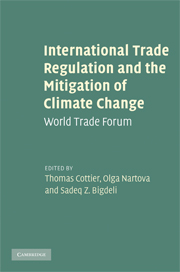Book contents
- Frontmatter
- Contents
- Contributors
- List of figures
- List of tables
- List of abbreviations
- Preface
- PART I Climate change mitigation: scientific, political and international and trade law perspectives
- PART II Climate change mitigation and trade in goods
- PART III Trade in renewable energy sources
- PART IV Climate change mitigation and trade in services
- 11 GATS, financial services and trade in renewable energy certificates (RECs) — just another market-based solution to cope with the tragedy of the commons?
- 12 Assessment of GATS' impact on climate change mitigation
- 13 GATS' commitments on environmental services: ‘hover through the fog and filthy air’?
- PART V Climate change and technology transfer, investment and government procurement: legal issues
- PART VI Institutional challenges and the way forward
- Index
- References
13 - GATS' commitments on environmental services: ‘hover through the fog and filthy air’?
from PART IV - Climate change mitigation and trade in services
Published online by Cambridge University Press: 04 August 2010
- Frontmatter
- Contents
- Contributors
- List of figures
- List of tables
- List of abbreviations
- Preface
- PART I Climate change mitigation: scientific, political and international and trade law perspectives
- PART II Climate change mitigation and trade in goods
- PART III Trade in renewable energy sources
- PART IV Climate change mitigation and trade in services
- 11 GATS, financial services and trade in renewable energy certificates (RECs) — just another market-based solution to cope with the tragedy of the commons?
- 12 Assessment of GATS' impact on climate change mitigation
- 13 GATS' commitments on environmental services: ‘hover through the fog and filthy air’?
- PART V Climate change and technology transfer, investment and government procurement: legal issues
- PART VI Institutional challenges and the way forward
- Index
- References
Summary
Introduction
Environmental services to date have drawn relatively few commitments under the General Agreement on Trade in Services (GATS) and seem to play only a modest role in the ongoing negotiations. Even if current offers materialised, the sector would still be trailing well behind other services such as banking, insurance and telecommunications with which, at first glance, it has some features in common. These include, not least, the dual nature of the activities concerned which, as in the case of sewage or refuse disposal services, may be destined either for private consumers or industrial users (including public facilities). Other commonalities are strong government involvement as producers and/or regulators, the co-existence of efficiency goals with distributional objectives and constraints (e.g. the perceived need to ensure universal access across all population groups), and the existence of various scheduling and classification problems due, inter alia, to the diverse nature of the activities covered.
However, whereas environmental services played second fiddle during the Uruguay Round and since, the results of the extended negotiations on telecommunications and financial services, both terminated in 1997, have been generally referred to as the most significant achievements under the GATS to date. This is particularly evident in the case of telecommunications, where participants not only managed to agree on a novel set of competition disciplines, enshrined in a so-called reference paper, but were also ready to accept certain guidelines and/or understandings on difficult scheduling issues and/or problems of legal interpretation.
- Type
- Chapter
- Information
- International Trade Regulation and the Mitigation of Climate ChangeWorld Trade Forum, pp. 274 - 280Publisher: Cambridge University PressPrint publication year: 2009
References
- 1
- Cited by



